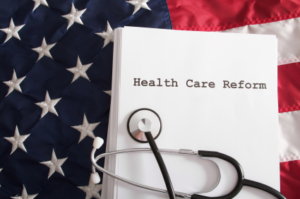Groups Work to Create New Codes for Social Determinants
Social determinants of health could have their own ICD-10 codes if a new initiative from the American Medical Association and United Healthcare succeeds.
 The two are working together to develop new ICD-10 codes that would take into consideration social determinants of health such as housing and food security, access to transportation, and ability to pay for medicine.
The two are working together to develop new ICD-10 codes that would take into consideration social determinants of health such as housing and food security, access to transportation, and ability to pay for medicine.
The project launches at a time when research suggests that social determinants of health can affect nearly 80 percent of health care outcomes.
Pennsylvania safety-net hospitals struggle more than other hospitals, and must work harder to address, the social determinants of health that play such a major role in the health and well-being of the residents of the low-income communities they serve.
Learn more in the Health Analytics IT article “AMA, UnitedHealth Partner for Social Determinants ICD-10 Project.”
 Introduced with bipartisan support, the legislation would extend for two years the current “Conrad 30” program that allocates 30 slots to each state so foreign-born doctors can work in medically underserved areas under J-1 visas. The program, which already exists but will soon expire, permits such physicians to remain in the U.S. for three years after their training ends to work in underserved areas. The legislation also would establish criteria under which more than 30 such physicians can be employed in a given state.
Introduced with bipartisan support, the legislation would extend for two years the current “Conrad 30” program that allocates 30 slots to each state so foreign-born doctors can work in medically underserved areas under J-1 visas. The program, which already exists but will soon expire, permits such physicians to remain in the U.S. for three years after their training ends to work in underserved areas. The legislation also would establish criteria under which more than 30 such physicians can be employed in a given state. The web site, mandated by Congress after the U.S. Department of Health and Services’ Inspector General found that some providers are being overcharged, will enable 340B-eligible providers to identify the maximum price they can be charged for covered drugs. This, HRSA believes, will help providers avoid being overcharged in the future.
The web site, mandated by Congress after the U.S. Department of Health and Services’ Inspector General found that some providers are being overcharged, will enable 340B-eligible providers to identify the maximum price they can be charged for covered drugs. This, HRSA believes, will help providers avoid being overcharged in the future. According to the Urban Institute report, repealing the entire Affordable Care Act would add almost 20 million Americans to the ranks of the uninsured. Medicaid and CHIP enrollment would fall by 15.4 million people and millions of others would lose the tax credits they used to purchase insurance. Some would purchase insurance with limited benefits and individual plan premiums would rise while others would go uninsured.
According to the Urban Institute report, repealing the entire Affordable Care Act would add almost 20 million Americans to the ranks of the uninsured. Medicaid and CHIP enrollment would fall by 15.4 million people and millions of others would lose the tax credits they used to purchase insurance. Some would purchase insurance with limited benefits and individual plan premiums would rise while others would go uninsured. The
The  Last week the Medicaid and CHIP Payment and Access Commission released its annual report to Congress, with most of the report focusing on its analysis and recommendations for policy updates involving Medicaid disproportionate share hospital payments (Medicaid DSH) and Medicaid upper payment limit payments (UPL payments).
Last week the Medicaid and CHIP Payment and Access Commission released its annual report to Congress, with most of the report focusing on its analysis and recommendations for policy updates involving Medicaid disproportionate share hospital payments (Medicaid DSH) and Medicaid upper payment limit payments (UPL payments). MACPAC commissioners discussed several statutory changes that would seek to minimize the impact of the court ruling:
MACPAC commissioners discussed several statutory changes that would seek to minimize the impact of the court ruling: According to a Pennsylvania Department of Health news release,
According to a Pennsylvania Department of Health news release,